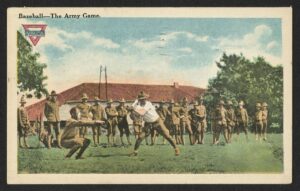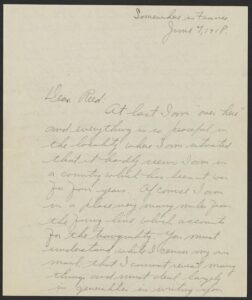When the United States entered World War I a century ago, Rutgers transformed into a war college focused on supporting America’s war effort. Many students and alumni joined the armed forces. Earl Reed Silvers, assistant to Rutgers president William H. S. Demarest, launched the Rutgers War Service Bureau as a means to keep in touch with Rutgers men in service. The Rutgers in the First World War series features stories from the War Service Bureau correspondence, offering a window on the impact of the war on Rutgers students and alumni 100 years ago.
At Rutgers: Baseball and Bombshells

The May 1918 War Service Bureau letters to men in service brought news of baseball and commencement activities at Rutgers. On May 20, Silvers wrote about a game taking place that afternoon.
“This afternoon we play Lafayette in baseball. . . . Johnny Lyons, our baseball captain, has gone to the Fourth Officers’ Camp; and so we’re not very optimistic about the result of the game this afternoon.”
Silvers reported that the number of graduates for the 1918 commencement was down due to men leaving Rutgers to serve. Although he was sure the previous year had 77 graduates, he stated the class of 1918 had 42 graduates in his May 20 letter, but his June 5 letter changed the number to 47 (according to the 1918 commencement program, the number should be 46). Some Rutgers men in service had returned to visit for commencement. In the May 20 letter, Silvers describes one such man bringing a souvenir:
“Bob Searle is here in uniform from Camp Devens. He brought with him an unexploded four-inch shell and my stenographer is in deadly fear of being blown to atoms.”
In his June 5 letter, Silvers followed up on this alarming gift to reassure the men
“That shell of Bob Searle’s which almost scared our stenographer to death wasn’t loaded, after all.”
From the Men: The Hazards and Pleasures of Travel
Rutgers men in service wrote to the Bureau in May and June 1918 to describe their travels overseas.
On May 1, 1918, August Grimme (class of 1918) wrote from the north of England.
“I am now located at a Gunnery School . . . The work is interesting and I enjoy it very much. The weather is rather uncomfortable up here. It seems almost like January. In fact we had a little snow flurry this morning.”
Reverend Maurice Kain’s (class of 1906) May 18, 1918 letter waxed poetic in its description of France (his correspondence folder does indeed contain a poem about France).
“France is remarkably colorful at this present springtime. The skylark wakes one morning. Blooming lilac hedges, surround him. Fertile fields lie beyond. But the more or less distant boom of guns, and the homing flight of flocks of airplanes tell one that farther beyond is —red war, red but glorious; or rather, glorious because red.”
On June 7, 1918 William P. E. Ainsworth (class of 1916) wrote of some rockiness on an otherwise calm ocean crossing to Europe,
“The trip over was wonderful. The sea was calm and the weather beautiful all of the way, except for about two days when it blew rather rough, and, as the seas caught us sideways, the boat rocked to beat the band. It sometimes rocked so that for hours, if you were sitting on deck, you were looking alternately at the sky above and the water beneath you, and unless you braced your steamer chair you would slide, chair and all, across the deck. Many of the men were dreadfully seasick, but it did not affect me in the least; in fact, I thoroughly enjoyed it.”

On June 26, 1918 Stuart M. Firth (class of 1914) described other watery travels on French soil (transcribed version also available).
“When we marched forty two days to take over our sector, we were accompanied for the forty-eight hours by the most generous supply of rain and snow and hail that this country could give. For two solid days everyone was wet to the skin. Raincoats were not more effective than blotting paper; trench boots, guaranteed to be waterproof when bought in the States, absorbed the bountiful liquid like a sponge.”
Despite these conditions, Firth maintained
“not a man grumbled, there was joking and laughing up and down the whole line and plenty of good old American cussing that did your heart good to listen to.”
[with assistance from Tara Maharjan]
To Learn More
The Rutgers College War Service Bureau collection has been digitized with assistance by a grant from the New Jersey Historical Commission, a division of the Department of State. A finding aid describing collection is available and provides links to the digitized materials.
*The commencement program for 1918 lists 46 graduates.